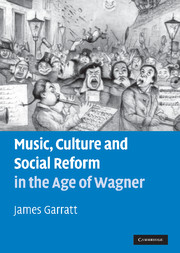Book contents
- Frontmatter
- Contents
- Acknowledgments
- Abbreviations
- Introduction
- 1 Liberalism, autonomy and the social functions of art
- 2 Radical and social aesthetics in the Vormärz
- 3 Speaking for the Volk: music, politics and Vormärz festivals
- 4 Revolutionary voices: blueprints for an aesthetic state
- 5 Music and the politics of post-revolutionary culture
- 6 The song of the workers: idylls and activism
- Notes
- Bibliography
- Index
3 - Speaking for the Volk: music, politics and Vormärz festivals
Published online by Cambridge University Press: 05 July 2011
- Frontmatter
- Contents
- Acknowledgments
- Abbreviations
- Introduction
- 1 Liberalism, autonomy and the social functions of art
- 2 Radical and social aesthetics in the Vormärz
- 3 Speaking for the Volk: music, politics and Vormärz festivals
- 4 Revolutionary voices: blueprints for an aesthetic state
- 5 Music and the politics of post-revolutionary culture
- 6 The song of the workers: idylls and activism
- Notes
- Bibliography
- Index
Summary
By the mid 1840s, reformers seeking to socialize and democratize music, or align it with progressive politics, could point to numerous practical examples of their ideals. It is these concrete developments in musical culture, the compositions written for them and the debates that they provoked that must now be our focus. To understand the functions, claims and limits of social art in practice, we must turn not to the professional institutions of autonomous art music, but rather to the principal forums for mass amateur musical participation: festivals, and the mixed and male-voice choirs that sustained them. In exploring Vormärz festival culture, three distinct types of event need to be taken into account: music festivals, singing festivals (Sängerfeste) for massed male voices, and politicized events commemorating great artists and national heroes, in particular, Schiller and Gutenberg festivals. The aims and functions of these events differed in many ways. But all offered models of collective action and sociability, providing a communal context for self-development and the pursuit of freedom. Such festivals – like the choral societies, gymnastics associations, student unions and sharp-shooting clubs that mushroomed in this period – embodied the ideal of free association, anticipating for Krüger and other progressives the ‘future greater life of our people’.
In practice just as in theory, musical democratization in the Vormärz seldom extended beyond the middle classes.
- Type
- Chapter
- Information
- Music, Culture and Social Reform in the Age of Wagner , pp. 84 - 127Publisher: Cambridge University PressPrint publication year: 2010
- 1
- Cited by



